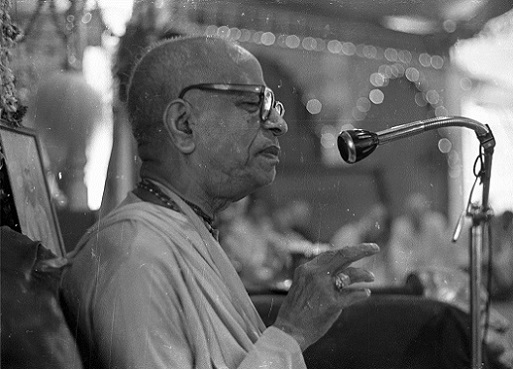(Srila Prabhupada delivering a lecture—click to enlarge)
Guest: Swāmījī, may I ask you a question?
Prabhupāda: Yes.
Guest: Do you teach self-realization?
Prabhupāda: Eh?
Guest: Do you teach self-realization?
Prabhupāda: Yes, this is self-realization.
Guest: Do you initiate?
Prabhupāda: Eh?
Guest: Do you initiate?
Prabhupāda: Yes. I initiate also. Well, this is the process of self-realization, to know...
Guest: Then you are an authority on self-rea... on initiation and self-realization, by self-realization?
Prabhupāda: Yes. And, of course, I do not know whether I am authority, but my spiritual master has authorized me to do this.
Guest: That's, that's all right. That's sufficient. That's sufficient.
Prabhupāda: I, I, I do not think myself an authority. I am just to serve the order of my spiritual master. That's all.
Guest: Yes. Very good. But I suppose you know that in the Western countries lots have been initiated and have never had the, the chance to be initiated by the master in order to initiate others. Quite a few, they have been.
Prabhupāda: Yes. Of course the, we... if we...
Guest: That's a responsibility in itself.
Prabhupāda: Yes, yes. Yes.
Guest: ... (indistinct)
Prabhupāda: Yes. So any other question? That, that, that, I mean to say, authority is very simple. It is not very difficult. Just like you'll find in the Bhagavad-gītā that self-realization, as far Bhagavad-gītā, was taught to Arjuna. Now, how Arjuna understood it, that is also mentioned in the Bhagavad-gītā. Simply if you try to understand Bhagavad-gītā as Arjuna understood it, then you also become self-realized. So it is not a very difficult job. Unfortunately, people apply their own scholastic ideas in a different way, and they murder the whole thing. You see? The simple thing is that if we understand it as it is, then it is as simple as anything. But if you want to...
Just like in our... in Bengal there is proverb, ghuriye nag nag naki. Now, you are asking me... just like sometimes we ask small child, "Where is your nose?" He says: "It is nose." "Where is your eye?" "It is eye." So that is a simple thing. But one child... not child. One man is asked, "Where is your nose?" He says: "Oh, here is my nose. Here is my nose," this is simple thing. But one should show, "Oh, here is my nose." So Bhagavad-gītā is interpreted like that, "Here is my nose." Nobody shows that "Here is my nose." You see? So that is the difficulty. They have created difficult, create a situation of this Bhagavad-gītā under, I mean to say, catastrophe. So if you, any sincere student who will take Bhagavad-gītā as it is, this self-realization is as cheap as anything.
Guest: Swāmījī, I suppose that lots of people do not realize.
Prabhupāda: No. It, simply, simply we have to hear it as it is. Don't try to interpret in a different way. The, the whole mischief is that everyone has got his own philosophy. And Bhagavad-gītā is a popular book, and he wants to prove his own philosophy through Bhagavad-gītā. Because he wants to be important man and he wants to show that "Here is mentioned in the Bhagavad-gītā," and they present some jugglery of words and mislead the people.
Just like I have repeatedly mentioned here that in our country, Mahatma Gandhi, he had his philosophy of nonviolence, and he wanted to prove nonviolence from Bhagavad-gītā. But Bhagavad-gītā is spoken in the war field. Bhagavad-gītā is spoken when Arjuna was in problem whether to fight or not to fight. That is the, I mean, the background of Bhagavad-gītā. Now, if anyone wants to prove that Bhagava... in Bhagavad-gītā there is nonviolence, then you, you, it is something else. Violence is there in the Bhagavad-gītā. So similarly, we should not try to understand Bhagavad-gītā according to my viewpoint of view. I must understand Bhagavad-gītā as it is presented by Kṛṣṇa. Then it is easy. Then it is easy.
(Srila Prabhupada Lecture, New York, July 18, 1966)
.
